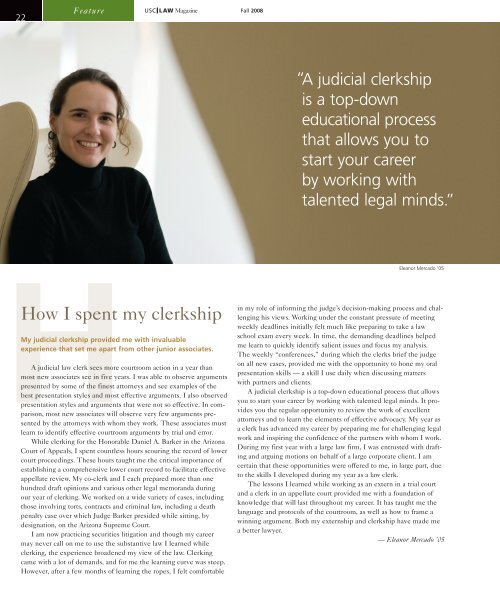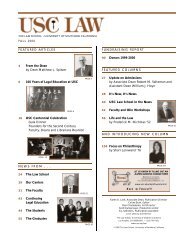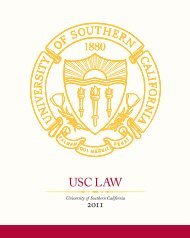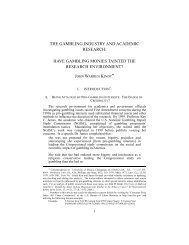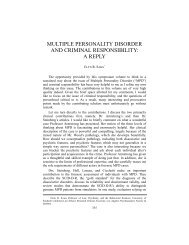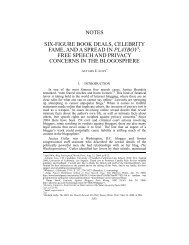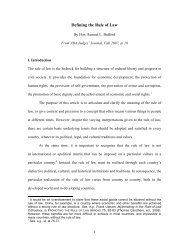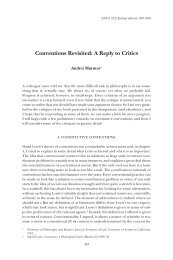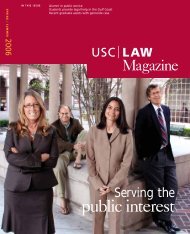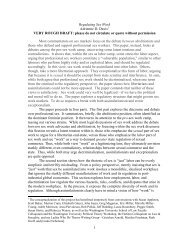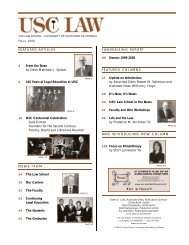Magazine - USC Gould School of Law - University of Southern ...
Magazine - USC Gould School of Law - University of Southern ...
Magazine - USC Gould School of Law - University of Southern ...
You also want an ePaper? Increase the reach of your titles
YUMPU automatically turns print PDFs into web optimized ePapers that Google loves.
22<br />
Feature <strong>Magazine</strong> Fall 2008<br />
How I spent my clerkship<br />
My judicial clerkship provided me with invaluable<br />
experience that set me apart from other junior associates.<br />
A judicial law clerk sees more courtroom action in a year than<br />
most new associates see in five years. I was able to observe arguments<br />
presented by some <strong>of</strong> the finest attorneys and see examples <strong>of</strong> the<br />
best presentation styles and most effective arguments. I also observed<br />
presentation styles and arguments that were not so effective. In comparison,<br />
most new associates will observe very few arguments presented<br />
by the attorneys with whom they work. These associates must<br />
learn to identify effective courtroom arguments by trial and error.<br />
While clerking for the Honorable Daniel A. Barker in the Arizona<br />
Court <strong>of</strong> Appeals, I spent countless hours scouring the record <strong>of</strong> lower<br />
court proceedings. These hours taught me the critical importance <strong>of</strong><br />
establishing a comprehensive lower court record to facilitate effective<br />
appellate review. My co-clerk and I each prepared more than one<br />
hundred draft opinions and various other legal memoranda during<br />
our year <strong>of</strong> clerking. We worked on a wide variety <strong>of</strong> cases, including<br />
those involving torts, contracts and criminal law, including a death<br />
penalty case over which Judge Barker presided while sitting, by<br />
designation, on the Arizona Supreme Court.<br />
I am now practicing securities litigation and though my career<br />
may never call on me to use the substantive law I learned while<br />
clerking, the experience broadened my view <strong>of</strong> the law. Clerking<br />
came with a lot <strong>of</strong> demands, and for me the learning curve was steep.<br />
However, after a few months <strong>of</strong> learning the ropes, I felt comfortable<br />
“ A judicial clerkship<br />
is a top-down<br />
educational process<br />
that allows you to<br />
start your career<br />
by working with<br />
talented legal minds.”<br />
Eleanor Mercado ’05<br />
in my role <strong>of</strong> informing the judge’s decision-making process and challenging<br />
his views. Working under the constant pressure <strong>of</strong> meeting<br />
weekly deadlines initially felt much like preparing to take a law<br />
school exam every week. In time, the demanding deadlines helped<br />
me learn to quickly identify salient issues and focus my analysis.<br />
The weekly “conferences,” during which the clerks brief the judge<br />
on all new cases, provided me with the opportunity to hone my oral<br />
presentation skills — a skill I use daily when discussing matters<br />
with partners and clients.<br />
A judicial clerkship is a top-down educational process that allows<br />
you to start your career by working with talented legal minds. It provides<br />
you the regular opportunity to review the work <strong>of</strong> excellent<br />
attorneys and to learn the elements <strong>of</strong> effective advocacy. My year as<br />
a clerk has advanced my career by preparing me for challenging legal<br />
work and inspiring the confidence <strong>of</strong> the partners with whom I work.<br />
During my first year with a large law firm, I was entrusted with drafting<br />
and arguing motions on behalf <strong>of</strong> a large corporate client. I am<br />
certain that these opportunities were <strong>of</strong>fered to me, in large part, due<br />
to the skills I developed during my year as a law clerk.<br />
The lessons I learned while working as an extern in a trial court<br />
and a clerk in an appellate court provided me with a foundation <strong>of</strong><br />
knowledge that will last throughout my career. It has taught me the<br />
language and protocols <strong>of</strong> the courtroom, as well as how to frame a<br />
winning argument. Both my externship and clerkship have made me<br />
a better lawyer.<br />
— Eleanor Mercado ’05


